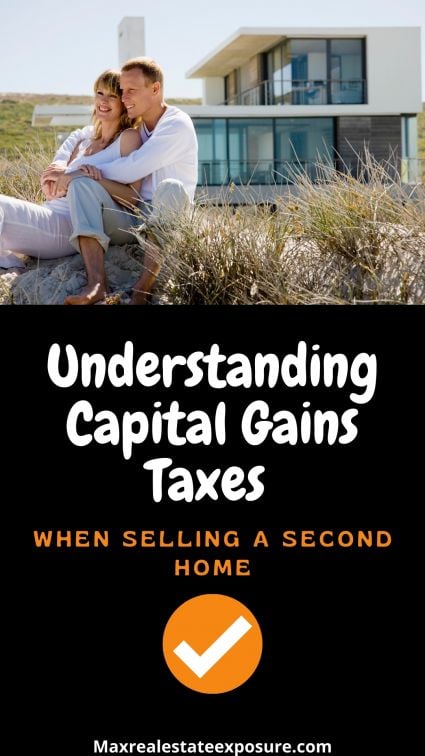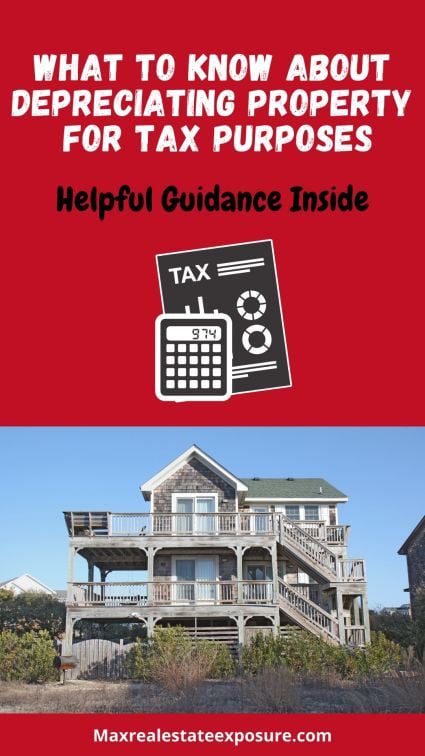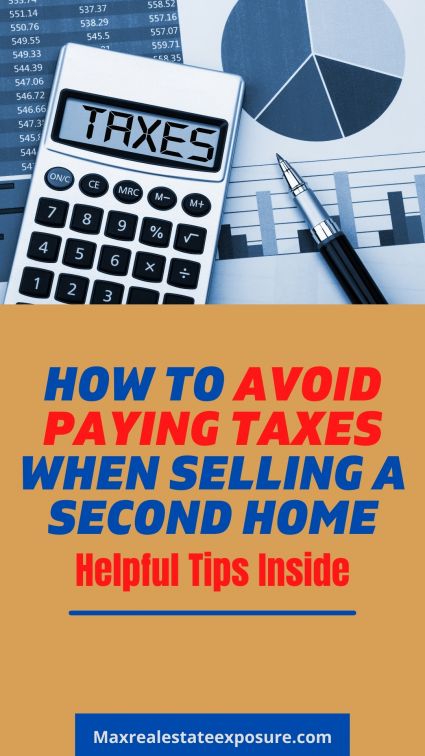Everything to Know About Paying Capital Gains Tax on a Second Home Sale
 Do you pay capital gains tax on a second home? Are you wondering how paying capital gains on a second home sale works?
Do you pay capital gains tax on a second home? Are you wondering how paying capital gains on a second home sale works?
When you sell a vacation home, rental unit fix-and-flip investment property, or any other second property that is not your primary residence, you will be held accountable for responsibilities related to capital gains taxes.
The tax burden can be as high as 20%
However, there are some strategies you may be able to employ to reduce your tax liability on capital gains.
We will examine the details of situations where investors can sensibly minimize their tax burden while reaping maximum returns as sellers.
We will give you all the info you need when filing your taxes.
You could have a tax bill waiting if you have a second home and decide it’s time to sell.
Tax Laws Are Different For Second Home Sales
While you may not have to pay real estate capital gains tax on your primary residence, rules around capital gains tax on selling a second home aren’t quite clear-cut.
What is clear is the rules on the sale of a second home won’t be the same as your primary residence.
Will you have to deal with capital gains on selling a second home?
If you are getting ready to sell a second residence, you need to know many things to minimize or avoid paying capital gains tax.
If you are considering buying a second home, maybe in some tropical destination, and want to know when you do eventually sell how it will be taxed, grab a cup of coffee.
Consider when you will need to pay capital gains on selling a second home and how much. By understanding the IRS rules, you could potentially cut your tax bill.
Let’s examine everything you need to know about the tax implications of selling a second home.
Capital Gains When Selling a Second Home is Different Than a Primary Residence
Before going over how taxes work on a second home sale, it is essential to understand the basics.
When you sell a house for a profit, the Internal Revenue Service(IRS) sees that profit as part of your taxable income. A house is what’s known as a capital asset.
Capital gains taxes are charged against any gains you have made once a property is sold.
For example, if you purchased a home for $500,000 and sold it for $650,000, you would have a $150,000 gross profit. The $150,000 is the amount of money the IRS considers taxable. However, there are exclusions in the tax laws.
These exclusions could help you potentially reduce your tax bill. The exclusion and other deductions are part of the tax benefits of owning a home that you can file on your tax return.
Capital Gains Exclusion Applies to a Principal Residence
If you sell your main home for more than you purchased, there is an exception to the standard IRS rules for taxing on a net profit. This is known as a home sale gain exclusion and could provide you with either $250,000 for single filers or $500,000 for married couples in capital gains tax exclusions.
However, the sale of second home tax exclusions isn’t the same, as the benefits come with your primary residence. Since your second home isn’t where you live most of the time, you won’t be able to gain financial advantages from this tax exclusion.
The IRS did away with the tax exclusion when selling a second home by introducing the Housing Assistance Act of 2008.
It’s essential to keep in mind the IRS considers your primary residence to be somewhere you have lived for at least two out of five years before the sale. If this is the case with your second home, you could receive an exclusion.
The IRS refers to the residency requirement as the “use test.” The primary residence rules will help determine what you will pay in taxes.
How Much Capital Gains Tax Will You Owe To The IRS?
The IRS looks at three main things to decide how much you need to pay in capital gains tax. These things are:
- Length of ownership
- Your tax rate
- The increase in value of the property
Let’s review the details of how your capital gains tax is decided.
How Long Have You Owned The Second Home?
 The IRS categorizes your ownership and capital gain as either short-term or long-term. It is considered a short-term gain if you have owned the home for a year or less.
The IRS categorizes your ownership and capital gain as either short-term or long-term. It is considered a short-term gain if you have owned the home for a year or less.
Usually, though, the capital gain will be considered long-term since most second homes will have been owned for more than a year when sold.
Sometimes life gets in the way with unforeseen circumstances that causes the need to sell. A good example is job changes that make the home sale necessary.
If your situation falls into the short-term gains category, it will be taxed as ordinary income in your tax bracket or using the marginal tax rate.
The tax you owe could potentially be as much as 37% of the profit you made from selling the home,e depending on your tax bracket.
For 2023 the income tax brackets are as follows:
- 10 percent
- 12 percent
- 22 percent
- 24 percent
- 32 percent
- 35 percent
- 37 percent
An excellent resource from Nerd Wallett provides a breakdown of the tax bracket based on your income. You can use this to determine the amount of capital gains you would be taxed on when selling a second home.
The capital gains tax rate for short-term ownership will be determined based on your income. As you can see, the short-term capital gains tax can be costly.
Tax Rates Are Important With an Additional Home
When you sell a second home you have owned for more than a year, you will be subject to long-term capital gains tax rates. This tax rate will depend on your income and be either 0%, 15%, or 20%. Whichever tax bracket you fall into, it will be less than the marginal tax rate for ordinary income.
To give you an idea of how the tax rates work, based on 2023 figures, $41,675 income or less will qualify you for 0% for single filers. Income between $41,676 to $459,750. will put you in the 15% bracket, and earnings above that will mean you have to pay the 20% tax rate.
If you are married and filing jointly with your spouse, your earnings have to be above $83,350 before you pay 15%, and you have to pay 20% when earning over $517,200. Your taxable gain will be much less when compared to short-term ownership.
Your filing status matters when it comes to paying taxes. There are some significant advantages to filing a joint return when paying capital gains taxes. Your tax burden will be reduced by quite a bit.
How Much Have You Gained From The Sale of Your Property?
While it might seem obvious how much you have profited on the sale of your home, it isn’t that straightforward. When you remove the fees and real estate commissions you had to pay when you purchased the home, your actual profits will be quite a lot less.
You can also deduct any money you spend on the property to renovate or make repairs. So if you’ve renovated the property, you can deduct that amount to reduce the capital gains tax you pay.
For example, you may have added a beautiful new en suite bath, updated the kitchen, replaced the roof, or even added a significant addition to the house.
As long as you still have the receipts, the IRS will consider this when calculating the capital gains due.
You will need to keep this all in mind when putting together your cost basis for the home. Your cost basis will be the sale price when you purchased your second home, the cost of any improvements, and any fees you paid to purchase the home.
Considering all these costs is crucial when figuring out what you will owe.
What Happens if You Have Depreciated Your Rental Property?
 You could have used depreciation deductions if your second home is a rental. This is where you can use the property’s depreciation to lower the tax you pay on your rental income.
You could have used depreciation deductions if your second home is a rental. This is where you can use the property’s depreciation to lower the tax you pay on your rental income.
Rental properties have a useful life of 27.5 years, which means it depreciates by 3.636% each year of the cost basis. The cost basis is the value of the property plus fees and commissions spent when purchasing but minus the land value.
The calculation gets more complicated when you have used the home part of the time and rented it the rest.
So if you had used the property as a second home for 20% of the year, with it available to rent for the rest of the year, you could have taken 80% of the depreciation.
However, the IRS won’t let you get away without paying capital gains on this depreciation, so they have a process known as depreciation recapture. The total depreciation you claimed while renting the home will now be taxed at 25%.
Capital Gains On The Sale of Second Home Example
Say that you bought a home in 2011 for $200,000. You also spent $10,000 on top of this by paying commission and fees, and then you spent $30,000 to renovate the home.
So far, you are up to $240,000, but you can also add expenses when you sell the home, including commission and closing costs.
Let’s say these expenses come to $30,000, and if the value now grew to $400,000 in 2023, you have a difference of $130,000.
You file jointly with your spouse and have an expected taxable income of $120,000 in 2023. Also, the second home doesn’t qualify for exclusion as it isn’t your primary residence.
Under this example, you would pay 15% on the $130,000 profit. Your tax bill would amount to paying $19,500 in capital gains tax.
If you have also rented out the property and claimed depreciation, more money will be paid to the IRS. If you have claimed $50,000 in depreciation, you’ll need to pay 25% of this to the IRS. This is another $12,500 making a total of $32,000 to pay in capital gains tax.
These might not be the only tax expenses you have to pay. These are just federal taxes. You could have state and other taxes to deal with as well.
Turning Your Second Home Into Your Primary Residence
Can you avoid paying capital gains taxes when selling a second home? You sure can!
If you want to avoid altogether paying capital gains tax when you sell your second home, you can do this if you’ve lived in it for 2 of the past 5 years as your primary home. This doesn’t have to be two consecutive years, so you could avoid paying the tax altogether if you can spend some extra time living in the property.
It would be best if you remembered; however, you can’t use this primary residence exception more than once in two years. This might be important if you consider selling your principal residence anytime soon.
As you can see, trying to avoid paying capital gains taxes on a second home sale can happen with proper financial planning. Your capital gains tax liability can be reduced to nothing.
How to Avoid Paying Capital Gains Tax When Buying Another Rental Property
 If you use the proceeds from the sale of the second home to buy another home to rent out, you can avoid paying tax on the sale of the second home. This is known as a 1031 exchange and lets you avoid paying the tax for the time being.
If you use the proceeds from the sale of the second home to buy another home to rent out, you can avoid paying tax on the sale of the second home. This is known as a 1031 exchange and lets you avoid paying the tax for the time being.
However, there are some strict rules you have to follow, and if you fail to stick to them, you will need to pay the capital gains. These rules are:
- Money from the second home sale has to go into an escrow account, and it can’t be used for anything else.
- You only have 45 days to find another property to buy.
- You also have to close on the new property within 180 days.
Make Sure The Home is Classified as a Rental Property
Along with these, other rules must be met to classify the home as a rental property.
- You are required to have owned the home for at least two years.
- It needs to have been rented for at least 14 days in the last 2 years.
- The home can’t have been used as a vacation property for more than 14 days, or 10% of the time it was rented for, during the last 2 years.
In addition to these rules for the home you sell, they also apply to the new home. If you are going to attempt a 1031 exchange, the difference between a second home and a rental property is quite specific.
You have to be careful to follow the rules. Otherwise, you could run into problems with the IRS. For this reason, it’s often better to get professional advice to avoid the sale of a second home tax.
Buying a second property to use for vacations, or to rent to tenants, can be incredibly profitable. But when you decide you need to sell, you have to be ready to deal with the capital gains tax that you could owe to the IRS.
Don’t Forget Property Tax Deductions With The Sale of a Second House
With the sale of a second residence, the internal revenue code allows you to deduct property taxes. However, there are limits.
The IRS now limits what you can do. You’re not allowed to deduct the entire amount of property taxes you paid on real estate owned anymore.
The total of local and state taxes eligible for a deduction is limited to $10,000 per tax return or $5000 if married and filing separately.
Hiring a Real Estate Tax Professional is Helpful
The rules when selling your primary residence are pretty easy to understand for most people. Hiring a tax advisor could be worth it when you are selling a second home and trying to understand the tax consequences.
There is no sense in getting yourself in trouble with the Internal Revenue Service due to a lack of knowledge or just plain ignorance. The current law could differ from prior years, as the tax code constantly changes.
When you sell a second home or investment property and are unsure of the tax implications, call in a pro for help. Professionals do this all day long. What may seem challenging to you and me is easy for those in the tax industry.
Whether you pay capital gains on selling your second home could come from planning and properly following tax laws. The capital gains or losses will be submitted on Schedule D (form 1040) when preparing your taxes.
Final Thoughts on Paying Capital Gains Tax on a 2nd Home
Investing in real estate can be both financially and emotionally rewarding. We all know how money can be made by buying and selling real estate. However, the other consideration is the quality of life you can have when purchasing a second home.
Whether you love sandy beaches or a ski resort, there are investment opportunities into whatever you love.
Vacation homes have become a prevalent option for those who have achieved that financial position. Investment properties have been and continue to be an excellent option for creating wealth.
Purchasing a second home can be one of the best decisions ever, especially when you have a strong grasp of the 2nd home tax laws. Hopefully, the information provided here has been helpful.
It is always best to consult with a tax professional, as everyone’s financial circumstances differ.
About the author: The above Real Estate information on paying capital gains taxes when selling your second home was provided by Bill Gassett, a Nationally recognized leader in his field. Bill can be reached via email at billgassett@remaxexec.com or by phone at 508-625-0191. Bill has helped people move in and out of many Metrowest towns for the last 37+ Years.
Are you thinking of selling your home? I am passionate about real estate and love sharing my marketing expertise!
I service Real Estate Sales in the following Metrowest MA towns: Ashland, Bellingham, Douglas, Framingham, Franklin, Grafton, Holliston, Hopkinton, Hopedale, Medway, Mendon, Milford, Millbury, Millville, Natick, Northborough, Northbridge, Shrewsbury, Southborough, Sutton, Wayland, Westborough, Whitinsville, Worcester, Upton, and Uxbridge MA.

